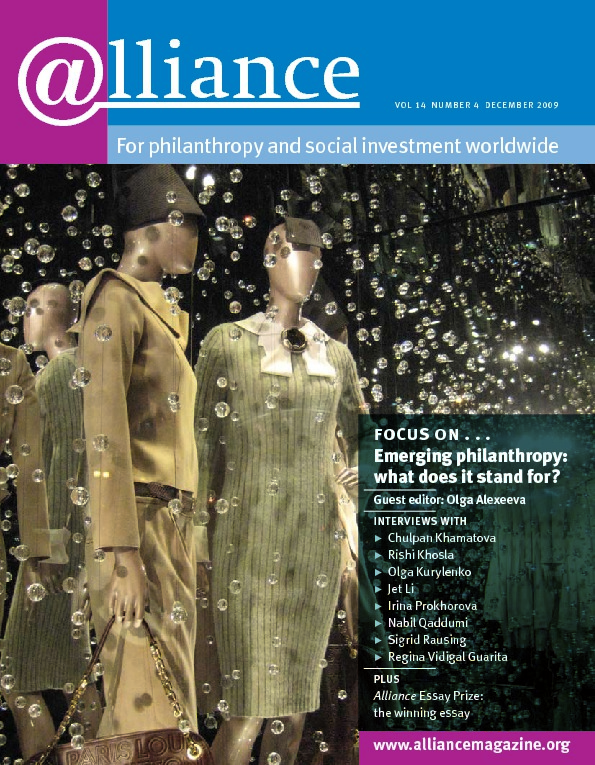I once attended an evening party organized by a wealthy family in a South American country, devoted to philanthropy. Guests, similarly ultra-wealthy families, gathered to talk about their giving, share experiences and possibly form alliances. I was invited as an outside expert with a knowledge of philanthropic trends in other places.
As I listened to the other guests talking, I began to realize that if giving is seen as just an accessory to a wealthy lifestyle rather an act that implies a complete moral worldview, such giving, new or old, will make no great changes in the world. That perhaps it is time to embrace the idea of ‘private social responsibility’.
 I heard one impeccably dressed lady share with a friend her frustration over peasants in the northern part of the country who did not want to move from their land despite ‘generous’ offers from the company she owned. Her friend nodded sympathetically and replied with a similar story of poor workers demanding some right or other …
I heard one impeccably dressed lady share with a friend her frustration over peasants in the northern part of the country who did not want to move from their land despite ‘generous’ offers from the company she owned. Her friend nodded sympathetically and replied with a similar story of poor workers demanding some right or other …
My glass of wine was forgotten, so shocked was I by such apparent contempt and disregard for people lower on the social ladder than these two ladies. Growing up in the Soviet Union, for all its faults, created in me a strong sense that all people are equal, regardless of their wealth or lack of it. Even more than this, I was shocked by the contrast between the real feelings of these ladies and their philanthropic aspirations.
Development of giving in BRIC economies
Organized philanthropy, for many years associated mostly with the western world, is today a growing phenomenon in the East and South. Individual giving in Russia more than tripled in 2008 alone despite the economic crisis. In China, where five years ago less than 3 per cent of the population gave to charity, in 2009, after a powerful impulse provided by the Sichuan earthquake, over 84 per cent of Chinese consider giving an important part of their lives. In Brazil, the first endowed private foundations were created in the past ten years, and India has also seen a surge of non-religious giving, especially by the new middle classes.
I can only welcome these developments. For many years, I have been a staunch advocate of eastern and southern giving and have urged the western philanthropic sector to see the potentially important new partners they can have in the East and South. But while I applaud new giving, that discussion at the party in South America keeps coming back to me. I still cannot shake off the feeling of acute disconnect between the scorn and negligence that were their everyday attitudes towards the poor and the patronizing care that characterized their philanthropy. Talking to a number of people in Asia and Africa confirmed to me that these are widespread attitudes. It clearly demonstrated that we need to address the issue of private as opposed to corporate social responsibility.
Towards a philanthropic ethics
Philanthropic ethics, along with the whole topic of philanthropy, was for many years an area dominated by US or UK donors. Even in the US, widely recognized as a flagship philanthropy development space, ethics in giving started to be widely discussed only relatively recently, and I am sure that same disparity between lifestyles and philanthropic practices still exists among donors even there. However, in relation to ‘new’ donors from the East and South, philanthropic ethics have never been properly discussed.
It is a common notion, especially in less sophisticated philanthropic environments, that the term philanthropic ethics applies only to the technicalities of giving, such as the grantmaking rules of foundations or areas of endowment investment (avoid tobacco, etc). I would argue that this term should be understood much more widely and should encompass the private life of philanthropists, especially the wealthy; their relationships with employees, including domestic servants; businesses they own (and those they influence), and even sometimes their conversations.
Just as in the corporate world the term corporate social responsibility now applies to the whole range of company activities, not just their community support budgets, we should start to demand from those actively and publicly involved in giving, or private social investment, adhesion to certain moral and ethical standards. We should insist that they extend the principles and objectives they employ in their giving – alleviation of poverty and social exclusion, environmental protection, access to education and health care – to those whom they employ or come across in their daily lives. Philanthropic missions and ideas should stem from acknowledged values and inform those values, but they should also be informed by them.
Donors practising what they preach
Unfortunately, especially among donors from the East and South, it is normal practice to strike your servants in the morning or evict farmers from your land with laughable compensation, and then in the afternoon sign cheques to charities helping the poor. It is absolutely acceptable to build a chemical plant in the delta of a life-saving river and the next day make an inspirational speech about global warming at an international conference.
A passage in the Bible adjures you not to let your right hand know what your left hand is doing. This phrase, at least in the Eastern Orthodox Christian tradition, is often used to support and encourage quiet philanthropy, generous anonymous giving. But it has a different twist in many parts of the world, where the right hand of donors deprives the poor and destroys the environment, while their generous left hand creates foundations and engages in venture philanthropy.
An organic tradition of giving
Another issue that is closely connected with the ethics of giving is the power of tradition. Philanthropy is not a western phenomenon, as Barbara Ibrahim rightly points out in her column in this issue; it is an ancient tradition in many parts of Asia and the Middle East. But if we ask ourselves whether philanthropy has changed there since then, the answer in many cases would be ‘no’.
Philanthropic tradition, preserved and nurtured, is an important motive for people to give; it is a benchmark against which many newcomers in philanthropy check their performance. But what if philanthropic tradition is set in the stone of centuries and only supports the status quo, and tradition is simply a justification for not changing anything, and not challenging current practices and approaches? In that case, I think such traditions needs to be revisited. Like anything else, tradition should evolve with time and reflect the changes in the economic, political and social life of countries. Just as the quantity of giving does not equal the quality of it, the longevity of philanthropic tradition does not prove that it has made lasting change in those societies.
Questions of how to preserve the long-term cultural capital and the frameworks of non-western societies, while achieving equality and social justice and decreasing social exclusion stretch far beyond philanthropy. But philanthropy is, and is becoming even more so, a powerful instrument to find solutions to this complex riddle. Philanthropy, by definition free of political games and fears, and able to experiment, can and should seek this balance between tradition and modernity. It should nurture models and ideas that respect the past but provide an equal and just future for everyone. For years these questions haunted western donors working in the East and South. But today, as the financial resources and the influence of western philanthropists diminish, these are questions we should ask donors in India and China, in Brazil and in the Gulf.
‘Fashion’ philanthropy
Finally, questions related to ethics and the direction of philanthropic development in the East and South are also key issues for philanthropy development organizations and for major fundraising charities who work with new donors in these areas. Too often, donor support organizations and fundraising charities content themselves with the fact that such-and-such a rich family has finally started giving at all. They do not put in front of them hard questions about the quality or ethics of their giving.
I admit I am guilty of this myself. For many years, I was just happy that we pushed wealthy Russians to open their pockets. How effective that giving was and what change it made in Russian society seemed much less important. As a result, we now have to struggle with two trends in the otherwise exponentially growing Russian philanthropy: the culture of ‘wants’, when donors fund something that appeals to them without thinking about whether it is actually needed and what beneficiaries think about it; and the culture of ‘direct help’ when masses of Russian middle-class donors reject the non-profit sector and prefer to give directly to individuals in need.
 In a number of other countries, the tendency of donor support organizations to follow their clients instead of leading them has resulted in the appearance of what I call ‘fashion’ philanthropy, where new words such as social investment or new models of giving such as venture philanthropy are adopted but neither donors nor support organizations actually ask: is it working? Do we need this or that nice-looking new giving framework, or do we copy it just because it is fashionable, a new philanthropic Gucci bag?
In a number of other countries, the tendency of donor support organizations to follow their clients instead of leading them has resulted in the appearance of what I call ‘fashion’ philanthropy, where new words such as social investment or new models of giving such as venture philanthropy are adopted but neither donors nor support organizations actually ask: is it working? Do we need this or that nice-looking new giving framework, or do we copy it just because it is fashionable, a new philanthropic Gucci bag?
Whatever we call philanthropy in Brazil or India, Russia or China, the Middle East or Africa – social investment, creative giving, philanthrocapitalism – these will just be words without changes in attitudes, without respect for and acknowledgement of people, without debate on private social responsibility and philanthropic ethics. We can bask in the sunshine of growing giving, but this sunshine will eventually dim if we don’t create a culture where donors start thinking not only how they want to give but also what is truly needed and what beneficiaries of their generosity think about it.
If we want to ensure that, in the coming years, philanthropy in all corners of the world truly enhances social justice, I think it is time to start exploring the notion of private social responsibility.
Guest editor for this Alliance special feature:
Olga Alexeeva is Head of CAF Global Trustees, responsible for promoting private and family foundations and CAF services to wealthy individuals around the world. Prior to this, she worked 12 years with CAF Russia (1993-2005), for the last seven years as director. Email oalexeeva@cafonline.org
 Comment Jacqueline Delia-Brémond
Comment Jacqueline Delia-Brémond
I feel a bit uneasy with the request to comment on Olga Alexeeva’s article as I wouldn’t like my answers to appear as if we in the West were trying to teach the new philanthropists in the East and South how to give away their money.
Nevertheless, one could say that there might be two stages for philanthropy, as there are say for collecting works of art. Firstly, you have to decide you want to spend your money that way, and secondly you have to get educated in order to be able to judge what is worth spending it on. That’s why I do not agree completely with Olga Alexeeva when she says that she regrets having urged the newly rich Russians simply to give away their money. That was only the first step and it had to be done.
The second step should be learning how to spend the money. It’s like the famous five Ws and one H taught to journalists to help them write a good article in a newspaper: Who? What? When? Where? Why? How?
At this point, some reflection is required to ensure that one’s individual actions as a donor are not in contradiction with one’s own behaviour as an individual or as head of a company. If the two are not in harmony, both the image and the message get confused. For instance, our foundation, Fondation Ensemble, is a private one but my husband’s company, Pierre & Vacances, which works in tourism, is totally in line with a sustainable attitude in its various sectors of activity (construction, use of water, environmental education in children’s clubs, etc) and in the proper functioning of the company. To us, as funders, it could not be any other way. It would be incoherent with our action within our foundation. This is part of the second step.
One could even go further and suggest that these new philanthropists, living in countries where the needs are sometimes huge, study what the real needs of their country are and try to act in a sector where their action is really needed.
A further step would be for philanthropists from countries where the actions of their own government and companies are having a devastating effect on some emergent countries to try to support projects that would counterbalance these negative actions.
Actually, one could say that philanthropy should be based more on reflection than on emotion, even if philanthropists should of course, like art collectors, be free to choose to act in fields that they find most interesting and gratifying to them.
In any case, I do believe that the same qualities should be applied to philanthropic action and personal behaviour as those used in successful business: rigour and strictness.
Jacqueline Delia-Brémond is founder and Vice-Chair of the Board of Trustees of Fondation Ensemble. Email dbremond@fondationensemble.org


Comments (0)